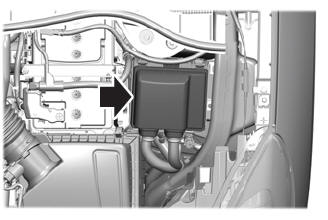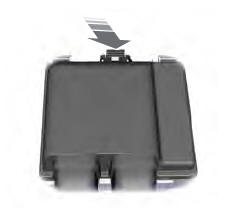Ford Escape: Climate Control System - General Information / General Procedures - Air Conditioning (A/C) System Recovery, Evacuation and Charging
Recovery
NOTICE: Use an A/C refrigerant analyzer before recovering any of the vehicle's A/C refrigerant. Failure to do so puts the shop's bulk refrigerant at risk of contamination. If the vehicle's A/C refrigerant is contaminated, refer the customer to the service facility that carried out the last A/C service. If the customer wishes to pay the additional cost, use the A/C recovery equipment that is designated for recovering contaminated A/C refrigerant. Dispose of all contaminated A/C refrigerant as hazardous waste in accordance with all federal, state and local regulations. For all equipment, follow the manufacturer's instructions.
-
Verify the refrigerant purity to recovery.
Refer to: Refrigerant Identification Testing (412-00 Climate Control System - General Information, General Procedures).
-
NOTE: Use only Ford Approved refrigerant management equipment.
For R1234yf the A/C Refrigerant Analyzer is equipped in the A/C machine. For R134a refrigerant the analyzer is a separate tool. For the A/C Refrigerant Analyzer. See A/C System Recovery, Evacuation and Charging Service Tools.
Refer to: Climate Control Tools and Equipment (412-00 Climate Control System - General Information, General Procedures).
-
Connect the tool to the low-side and high-side service
gauge port valves following the manufacturer's instructions.
-
For the A/C Refrigerant Management Center and A/C Service Unit. See A/C System Recovery, Evacuation and Charging Service Tools.
Refer to: Climate Control Tools and Equipment (412-00 Climate Control System - General Information, General Procedures).
-
For the A/C Refrigerant Management Center and A/C Service Unit. See A/C System Recovery, Evacuation and Charging Service Tools.
-
NOTE: Never attempt to recover from only the low side service gauge port valve (solenoid valves in the system will not allow for full recovery). Open solenoid valves.
Recover the refrigerant from the system following the manufacturer's instructions. Note the amount of oil removed during the refrigerant recovery (if any). Add that same amount back into the system once repairs are complete.
Refer to: Refrigerant Oil Adding (412-00 Climate Control System - General Information, General Procedures).
-
Allow the system to set for about 2 minutes and observe
the system vacuum reading. If the vacuum is not lost, disconnect the
recovery equipment.
-
If the system loses vacuum, repeat Steps 3 through 5 until the vacuum level remains stable for 2 minutes.
-
Carry out the required repairs.
Evacuation
-
Connect the tool to the low-side and high-side service
gauge port valves following the manufacturer's instructions.
-
For the A/C Refrigerant Management Center and A/C Service Unit. See A/C System Recovery, Evacuation and Charging Service Tools.
Refer to: Climate Control Tools and Equipment (412-00 Climate Control System - General Information, General Procedures).
-
For the A/C Refrigerant Management Center and A/C Service Unit. See A/C System Recovery, Evacuation and Charging Service Tools.
-
NOTE: Never attempt to recover from only the low side service gauge port valve (solenoid valves in the system will not allow for full recovery). Open solenoid valves.
Evacuate the system until the low-pressure gauge reads at least 99.4 kPa (29.5 in-Hg) of vacuum and as close to 101.1 kPa (30 in-Hg) as possible. Continue to operate the vacuum pump for a minimum of 45 minutes.
-
Turn off the vacuum pump. Observe the low-pressure gauge for 10 minutes to make sure the system vacuum is held.
Charging
-
Lubricate the refrigerant system with the correct amount of clean refrigerant oil.
Refer to: Refrigerant Oil Adding (412-00 Climate Control System - General Information, General Procedures).
-
Connect the tool to the low-side and high-side service
gauge port valves following the manufacturer's instructions.
-
For the A/C Refrigerant Management Center and A/C Service Unit. See A/C System Recovery, Evacuation and Charging Service Tools.
Refer to: Climate Control Tools and Equipment (412-00 Climate Control System - General Information, General Procedures).
-
For the A/C Refrigerant Management Center and A/C Service Unit. See A/C System Recovery, Evacuation and Charging Service Tools.
-
Set the refrigerant charge amount and charge the refrigerant system following the manufacturer's instructions.
 General Procedures - Air Conditioning (A/C) System Leak Test Using Forming Gas
General Procedures - Air Conditioning (A/C) System Leak Test Using Forming Gas
Special Tool(s) /
General Equipment
Forming Gas Pressure Gauge and Leak Detector
Materials
Name
Specification
Forming Gas
-
Leak detection
All vehicles
NOTE:
Use a Rotunda-approved Forming Gas A/C System
Dealership Leak Detection Service Kit that meets SAE J2790...
 General Procedures - Air Conditioning (A/C) System Recovery, Evacuation and Charging - 2.5L Duratec – Hybrid (121kW/164PS) (BG)
General Procedures - Air Conditioning (A/C) System Recovery, Evacuation and Charging - 2.5L Duratec – Hybrid (121kW/164PS) (BG)
Special Tool(s) /
General Equipment
Refrigerant Identification Equipment
Check
NOTE:
For all equipment, follow the manufacturer's instructions...
Other information:
Ford Escape 2020-2025 Service Manual: Removal and Installation - Drive Pinion Flange
Special Tool(s) / General Equipment 205-126 (T78P-4851-A) Holding Fixture, Drive Pinion Flange 205-233 (T85T-4851-AH) Installer, Drive Pinion FlangeTKIT-1985-FH-1 303-249Remover, Crankshaft Timing Pulley Transmission Jack Flat-Bladed Screwdriver Wooden Block Materials Name Specification Motorcraft® Premium Long-Life GreaseXG-1-E1 ESA-M1C..
Ford Escape 2020-2025 Owners Manual: Fuel Tank Capacity. Fuel and Refueling – Troubleshooting
Fuel Tank Capacity Advertised Capacity The advertised capacity is the maximum amount of fuel that you can add to the fuel tank when the fuel gauge indicates empty. In addition, the fuel tank contains an empty reserve. The empty reserve is an unspecified amount of fuel that remains in the fuel tank when the fuel gauge indicates empty. Note: The amount of fuel in the empty reserve varies and ..
Categories
- Manuals Home
- 4th Generation Ford Escape Owners Manual
- 4th Generation Ford Escape Service Manual
- Accessing the Trip Computer. Resetting the Trip Computer
- All-Wheel Drive
- Description and Operation - Identification Codes
- New on site
- Most important about car
Under Hood Fuse Box
Locating the Under Hood Fuse Box

Accessing the Under Hood Fuse Box

